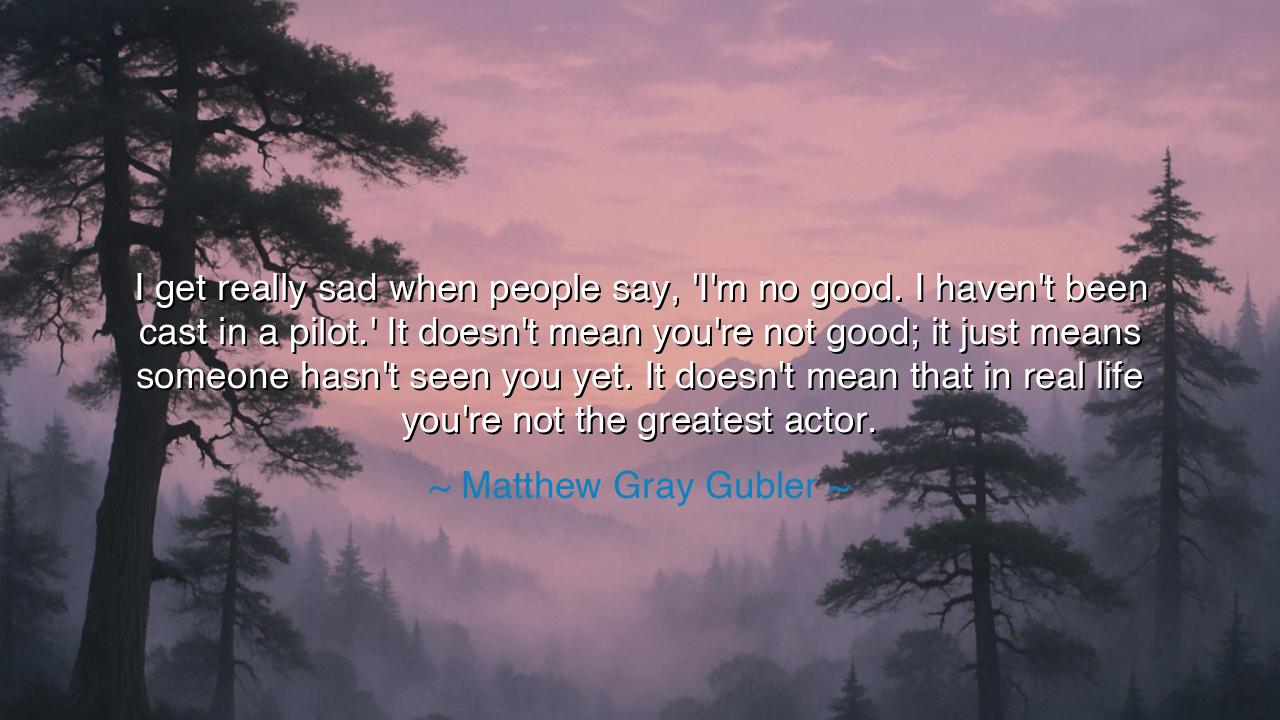
I get really sad when people say, 'I'm no good. I haven't been
I get really sad when people say, 'I'm no good. I haven't been cast in a pilot.' It doesn't mean you're not good; it just means someone hasn't seen you yet. It doesn't mean that in real life you're not the greatest actor.






Hear, O seekers of encouragement, the wise and gentle words of Matthew Gray Gubler, who spoke not only to actors but to all souls who labor unseen: “I get really sad when people say, ‘I’m no good. I haven’t been cast in a pilot.’ It doesn’t mean you’re not good; it just means someone hasn’t seen you yet. It doesn’t mean that in real life you’re not the greatest actor.” His words are a balm to the weary spirit, reminding us that worth is not measured by the fleeting approval of the world, but by the truth of one’s inner gift.
First, let us hear his sorrow: I get really sad when people say, ‘I’m no good.’ For this is the cry of countless hearts—artists, workers, dreamers—who mistake rejection for unworthiness. The casting room, the interview, the competition—these are cruel arenas where the decision of one stranger can feel like a verdict on the whole soul. Gubler names the lie that so many believe: that failure to be chosen equals failure of being. He grieves this because he knows it is not true.
Then comes his reassurance: “It just means someone hasn’t seen you yet.” How powerful this is. Talent, truth, beauty—all of these can exist unseen, like a hidden spring beneath the earth. Just because no one has drawn from it yet does not mean it has no water. The unseen is not the nonexistent. Many who change the world labor in silence before their gifts are recognized. Thus, he teaches us patience: that timing, not worth, is often what holds us back from being chosen.
Consider the story of Emily Dickinson, who wrote hundreds of poems that the world did not celebrate in her lifetime. She might have said, “I am no good; no publisher has chosen me.” Yet her words endured, hidden in drawers, until at last the world discovered them and declared her among the greatest poets. Like the unseen actor, her worth was not diminished by obscurity; it only waited for its moment to be revealed.
Gubler goes further: “It doesn’t mean in real life you’re not the greatest actor.” Here is the heart of his teaching: identity is not bestowed by others, but recognized within the self. To be an actor is not only to be cast, but to breathe truth into characters, to live with empathy, to embody the art even when no one is watching. So too with all vocations: the teacher is a teacher before the classroom, the poet a poet before the book, the leader a leader before the crowd. One’s greatness is not erased by lack of recognition.
The meaning of his words, then, is this: never confuse external validation with inner worth. The world may not yet recognize you, but that does not mean you are not already carrying greatness within. Rejection is not the final word; it is only the silence before the echo of your voice is finally heard.
So, dear listener, take this lesson to heart: when you are overlooked, do not call yourself worthless. When you are passed over, do not say you are no good. Instead, continue to hone your craft, to live your truth, to embody your gift. Take practical steps: practice daily, seek joy in your art even when unseen, and remind yourself that timing belongs to fate, but worth belongs to you. For as Gubler teaches, greatness is not given by casting calls or applause—it is carried in the soul, waiting to be seen. And one day, when the world opens its eyes, it will find what was there all along.






AAdministratorAdministrator
Welcome, honored guests. Please leave a comment, we will respond soon